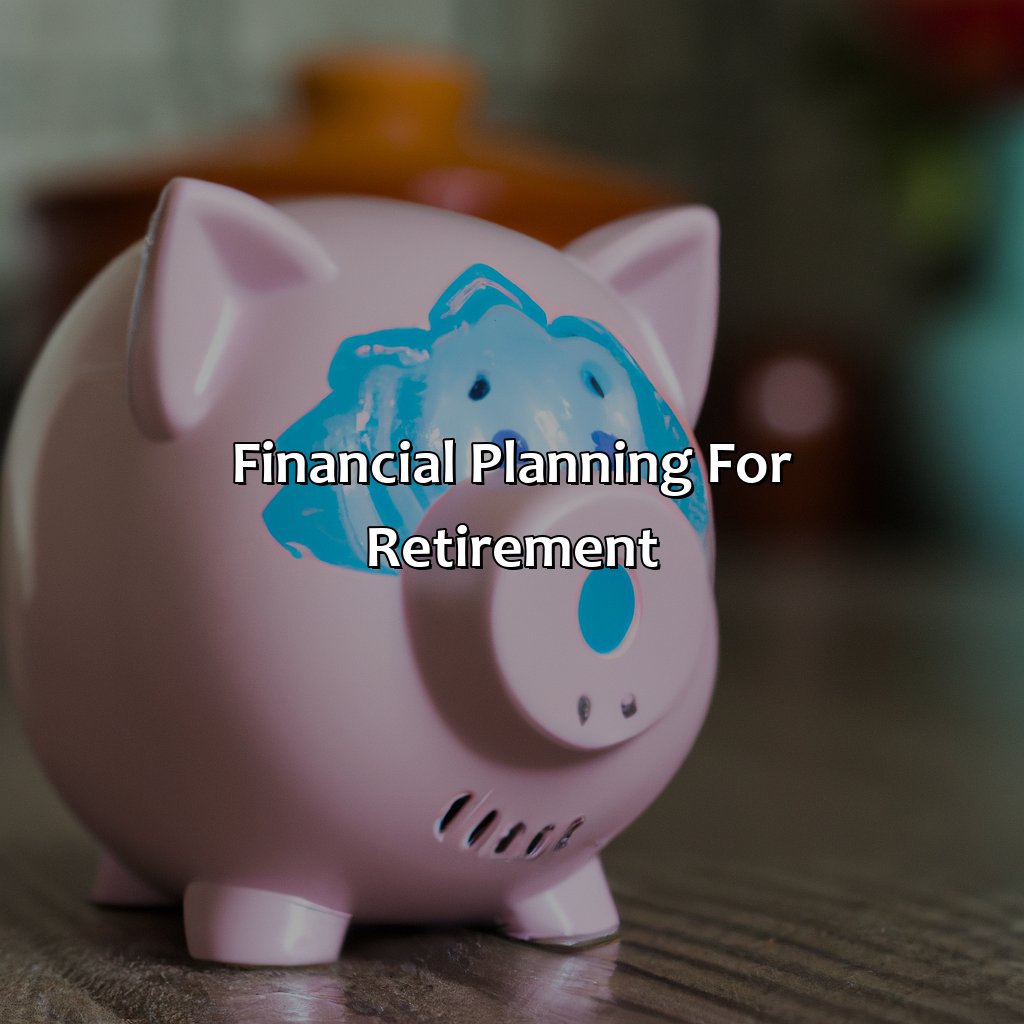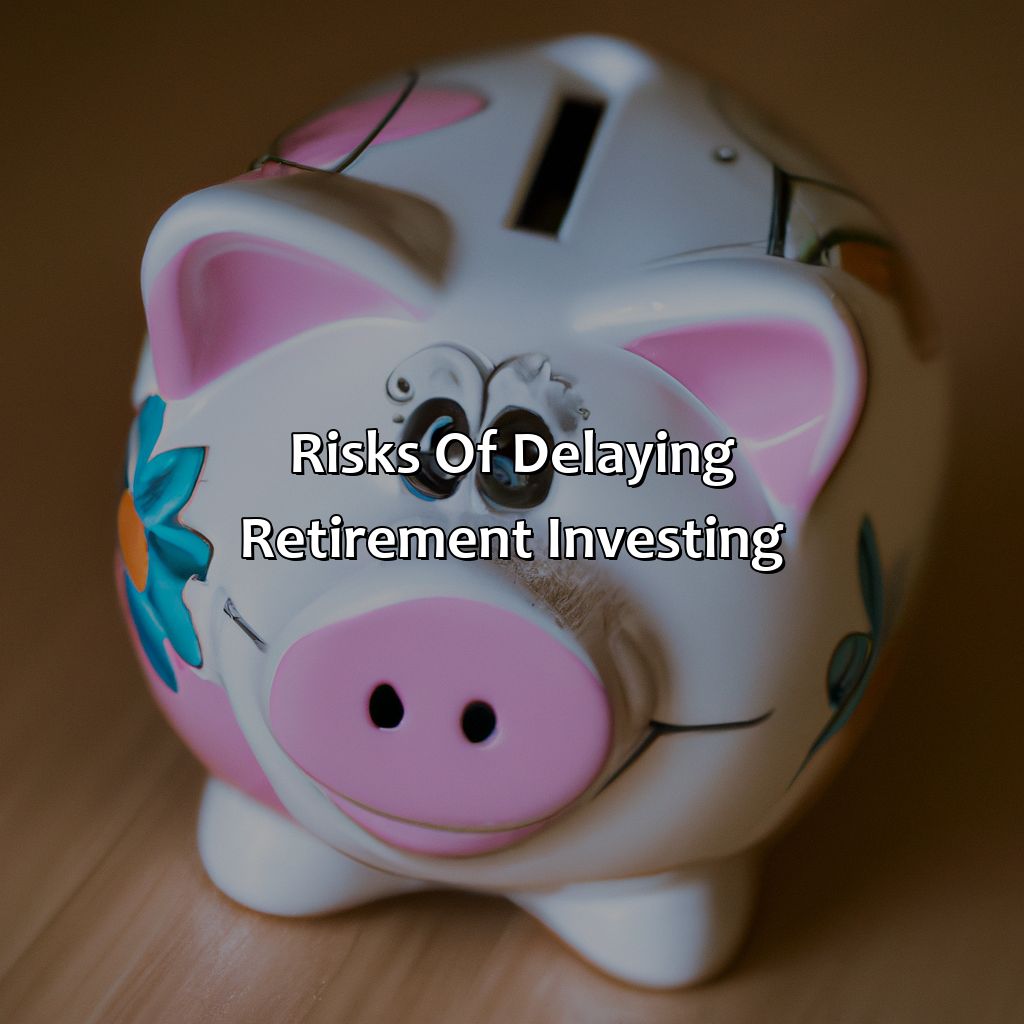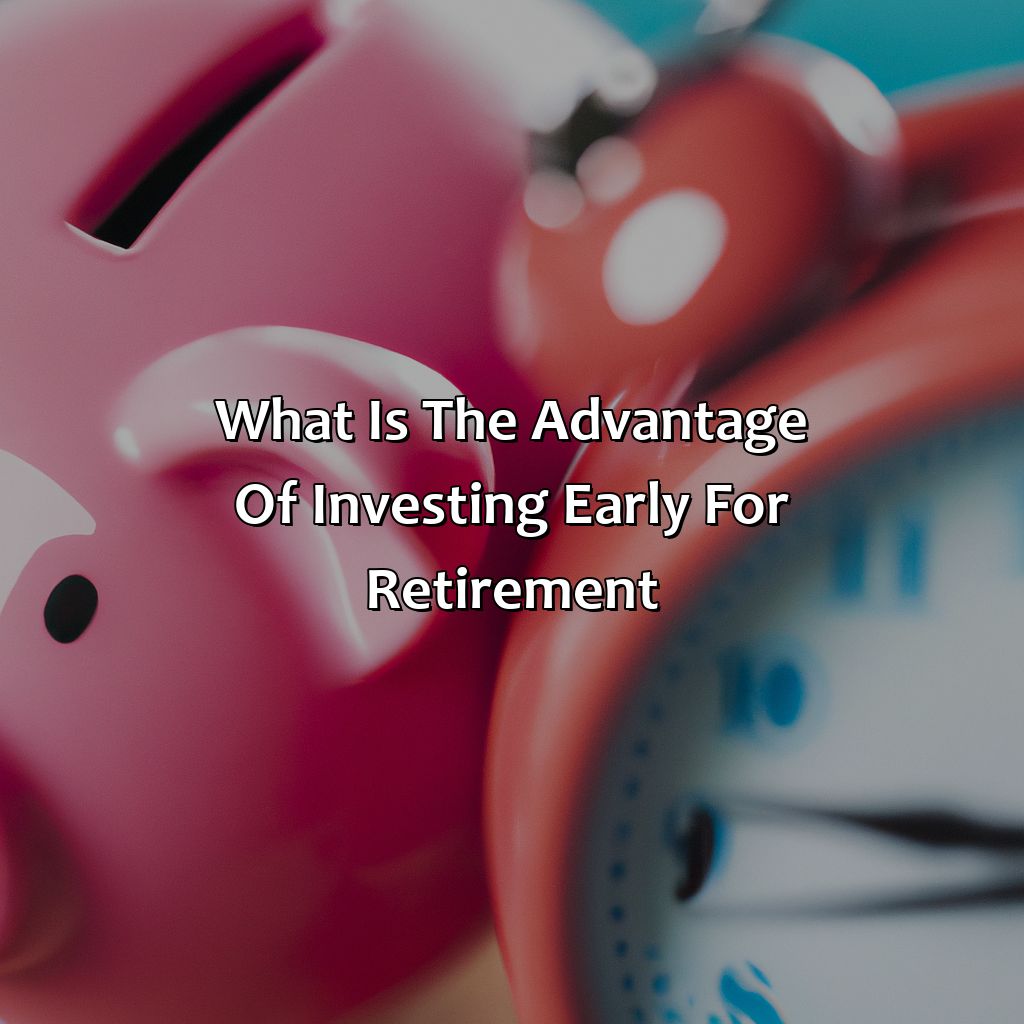What Is The Advantage Of Investing Early For Retirement?
Key Takeaway:
- Investing in retirement early allows for compound interest to take effect, resulting in potentially significant gains over time.
- Financial planning for retirement is crucial in determining retirement savings goals and strategies, ensuring a comfortable retirement.
- Enrolling in a retirement plan offers various benefits, including tax advantages and employer contributions, increasing the value of early retirement investing.
Are you feeling overwhelmed about planning for your retirement? Early investing can be the key to a stress-free retirement and financial security. Learn how to make the most of time for your retirement savings.
Importance of Investing Early for Retirement
For a comfy retirement, think about investing early! With Early Retirement Investing, you can get awesome advantages, like Compound Interest. Early Retirement Investing gives you great financial benefits in the long run.

Image credits: retiregenz.com by David Woodhock
Benefits of Early Retirement Investing
Investing for an early retirement has several benefits that can provide financial security and peace of mind. Here are four reasons why you should start early and invest in your retirement.
- Compound Interest: Starting early allows your investments to grow exponentially through the power of compound interest.
- Flexible Saving Options: Investing early gives you more options for saving, such as IRA or 401(k) plans, to diversify your portfolio.
- Long-Term Planning: An early start gives you an advantage in long-term planning, helping to adjust investment strategies and ride out market fluctuations.
- Early Retirement: An early start may give you the option to retire earlier than anticipated without sacrificing your desired quality of life.
Additionally, investing early can help offset potential setbacks, such as unexpected expenses or loss of income later in life. By starting early, you can create a sense of financial stability that will make retirement a less stressful experience.
It’s important to note that investing is not a one-size-fits-all approach. It’s best to seek out professional advice for finding the right investment strategy for you.
According to a study by Vanguard, the average 401(k) balance for participants over age 60 who had been contributing continuously for at least 30 years was approximately $386,000.
Saving early for retirement is like planting a money tree, with compound interest as the fertilizer.
Compound Interest and Early Retirement Investing
Investing early for retirement provides a significant advantage as it allows for the compounding of interest over time. When this strategy is employed, an individual can potentially receive greater benefits from their investments than they otherwise would have. This is due to the fact that even small amounts invested consistently over time can grow substantially and generate substantial returns.
By harnessing the principle of compounding interest, those who invest early in their lives give themselves a greater window of opportunity to build up their savings for later years. Early investment also grants a degree of flexibility as people can afford to take risks with their funds without having to worry about immediate financial constraints.
Furthermore, investing early means one can reduce the need for aggressive saving as they approach retirement age since their investments will have had ample time to grow. This provides retirees with greater security and freedom in how they go about spending or managing their finances during retirement.
Pro Tip: Start investing even if you don’t feel financially prepared yet. A small contribution made consistently over a period can grow into something significant for your future retirement plans.
Retiring without financial planning is like jumping out of a plane without a parachute – it’s gonna hurt.
Financial Planning for Retirement
Secure your retirement with financial planning! We’ll cover two topics: Retirement Savings Goals and Retirement Savings Strategies. Get the solutions and insights you need for a successful retirement. Invest early to gain the advantage!

Image credits: retiregenz.com by Adam Duncun
Retirement Savings Goals
Retirement planning objectives entail a plethora of financial aspects that require thorough consideration. It’s important to define the retirement savings goal early on and strategize accordingly to secure an adequate nest egg. Here are six points to keep in mind:
- Assessing the current financial situation
- Determining future expenses and budgeting accordingly
- Calculating the cost of living adjustments, inflation rates, and potential health care expenses
- Estimating Social Security benefits as part of retirement income planning
- Identifying investment vehicles that align with personal goals and risk tolerance
- Regularly reviewing the plan to ensure it adjusts for any significant life changes
In order to pursue a successful retirement outcome, one should stay updated with progressive tenets in finance, market trends, and government regulations. While it may seem daunting, early commencement towards securing final liberation is crucial.
On numerous occasions, retirees opted to plunge into their company’s retirement plans immediately after beginning working at smaller wages than they had previously received. Time showed relentless ardency; those who started saving early were benefitted through accumulated interest compounded over multiple years. The compounding of interest associated with generous contributions made them financially stable at retirement while others struggled with scarce finances nearing their golden years.
Saving for retirement is like planting a money tree- the sooner you start, the bigger your harvest will be!
Retirement Savings Strategies
Investing early for retirement provides a crucial advantage in securing financial stability. By taking control of your retirement savings strategy, you can set yourself up for success. Leveraging investment accounts like IRAs and 401(k)s with long-term growth potential is key. Dividing investments between stocks and bonds can help mitigate risk. Protecting assets by minimizing debt and managing expenses are additional effective strategies.
One unique detail to consider is the impact of compound interest over time. The earlier one invests in a retirement account, the longer their money has to grow through compound interest. For example, if an individual invests $10,000 at age 25 with an annual return rate of 7%, they could potentially have over $76,000 by age 65.
According to Vanguard’s research “How America Saves,” employees who used auto-enrollment–that is, those who were automatically enrolled at the default savings rate and investment-selection options selected by their employer—had median annual account balances three times those investors in voluntary plans without such features.
Planning for retirement is like investing in a fancy 401(k) plan- the earlier you start, the more you’ll have to show off at the retirement party.
Investing in Retirement Plans
Ready to invest in your retirement? You’ll need to know about the types of retirement plans. We’ll discuss how enrolling in a plan can help you. Keep reading to learn more!
This section has two sub-sections. They cover:
- Types of retirement plans
- Advantages of retirement plans
Get ready to plan for your future!

Image credits: retiregenz.com by Harry Washington
Types of Retirement Plans
Retirement planning is crucial for a secure future. Here’s a glimpse of some retirement plans you can invest in:
- Employer-sponsored– Participants invest part of their salary deducted before taxes, for example, 401(k).
- Individual Retirement Accounts (IRA)– Traditional IRAs have tax-deferred contributions, and Roth IRAs have after-tax withdrawals.
- Simplified Employee Pension (SEP) – Self-employed individuals or small business owners contribute pre-tax income to their retirement account.
It’s essential to enhance your financial knowledge when it comes to investing in your future. There are various ways and means to create wealth during retirement years.
Investing early maximizes returns due to the magic of compounding. It refers to earning interest on principal plus accumulated interest. A delay of a few years in starting investments equates to a significant reduction in overall returns.
One critical aspect that takes active participation is knowing what percentage of your salary needs investing realistically. Simultaneously, choose investment options well suited according to age and financial goals.
Investing early towards a retirement plan benefits by saving money over time while gaining compound interest exponentially growing portfolio value over time!
Investing in a retirement plan is like a time machine- you save now and get to party later!
Benefits of Enrolling in a Retirement Plan
Retirement Plan – Benefits of Early Investment
Investing early in a retirement plan can reap many benefits for individuals. Here are some ways where enrolling early in a retirement plan can provide advantages:
- Compound Interest: Early investments benefit from compound interest, allowing the investment’s gains to grow exponentially.
- Tax Breaks: Retirement plans offer significant tax breaks that help enhance savings and allow contributions to grow more efficiently.
- Lower Risk Taking Capabilities: Early enrolment provides an extended period before and after retirement, allowing individuals to take lower risks with their investment portfolios.
- Financial Security: A well-funded retirement account can lay the foundation necessary for long-term financial security during your post-retirement life stage.
- Catch-up Contributions: Early enrolment also allows for additional catch-up contributions as individuals approach retirement age restricting limits.
Additionally, various other benefits result from early enrolment in a retirement plan. Individuals can accumulate more significant savings, maximize employer matches, or qualify for Social Security benefits by investing early.
To remain financially secure and ensure stability after retirement, consistently contributing to a retirement plan is crucial. Ensure you analyze and identify your risk profile correctly and adjust your investment strategy accordingly.
Investing in a financially strong company is another way to optimize your portfolio. By diversifying stocks over many different firms, you can protect against volatility and minimize unpredictability. Ultimately, these steps contribute significantly to ensuring that you’re meeting your financial goals securely.
Delaying retirement investing is like waiting until you’re thirsty to dig a well.
Risks of Delaying Retirement Investing
Retirement investing should start as soon as possible to dodge the risks of delay. Inflation and lost chances are two major points to think about. Weigh the pros of investing now against waiting and possibly missing out on income due to lost chances and inflation.

Image credits: retiregenz.com by James Arnold
Inflation and Retirement Investing
Starting early with retirement investing is the key to mitigating the impact of inflation in the long run. The effects of inflation on your investment grow over time, and delaying the process can result in significant losses.
Investing early for retirement allows you to enjoy compound interest over an extended period, which helps boost your savings and offsets inflation’s negative effects. It ensures that you have sufficient funds to lead a comfortable life after retirement.
Inflation not only decreases your purchasing power but also erodes the actual value of your money, resulting in reduced returns. Putting off investing for retirement exposes you to higher risks, including needing to work longer or reducing your standard of living.
It is essential to calculate inflation’s impact when designing a retirement investment portfolio by including assets that increase alongside changes in inflation rates, such as stocks and real estate investments.
According to Vanguard Research, delaying investing for ten years can reduce final retirement savings by 25%, highlighting the importance of starting early with saving and investing for retirement.
If only procrastination burned as many calories as regret does in old age.
Missed Opportunities for Retirement Savings
Retirement Plans: Avoiding the Consequences of Delayed Investment
Investing at the appropriate time is crucial, particularly when it comes to retirement. Failing to invest early could result in missed opportunities for retirement savings later on. Investing quickly and allocating assets over the long haul boosts the probability of developing greater savings by the time you retire.
Delaying your investment can lead to lower monthly returns, resulting in a smaller nest egg come retirement age. An adequate understanding of risks and rewards associated with investing can help one make informed decisions regarding their investments.
Beginning investment early might seem challenging for folks managing bills on depleted wages. However, establishing a robust budget plan to track expenses will enable saving toward achieving those sizeable goals eventually.
Some Facts About Investing Early For Retirement:
- ✅ Compounding interest allows early investors to earn more returns over time. (Source: Investopedia)
- ✅ Starting early for retirement gives investors more time to ride out market fluctuations and economic downturns. (Source: The Balance)
- ✅ Time is a valuable asset for retirement planning, as it allows early investors to contribute smaller amounts over a longer period of time. (Source: NerdWallet)
- ✅ Early retirement planning can lead to greater financial security and independence in later years. (Source: Forbes)
- ✅ Waiting to invest for retirement can result in missed opportunities for growth and a smaller retirement nest egg. (Source: CNN Money)
FAQs about What Is The Advantage Of Investing Early For Retirement?
What is the advantage of investing early for retirement?
Investing early for retirement offers numerous advantages, such as:
- Compounding interest that can grow your money exponentially over time
- Higher returns due to longer investment periods and reduced risk
- Opportunities to diversify your investment portfolio to mitigate risk
- Less financial stress later in life as you have greater financial security
- More years to plan and save for your retirement goals
- Ability to retire earlier and enjoy your golden years
What are some strategies for investing early for retirement?
Here are some strategies that can help you invest early for retirement:
- Open a retirement account, such as a 401(k) or IRA, and contribute regularly
- Start with small amounts and increase your contributions as your income grows
- Invest in a mix of stocks, bonds, and mutual funds that align with your retirement goals
- Use a financial advisor to help create a personalized retirement plan
- Monitor your investments regularly and adjust your portfolio as needed
Can I invest too much for retirement?
While there is no such thing as investing too much for retirement, it is important to strike a balance between saving for retirement and meeting your current financial needs. It’s important to have an emergency fund set aside and to prioritize paying off high-interest debt before maximizing your retirement contributions. It’s also wise to stay aware of contribution limits and be mindful of any fees associated with your investments.
What is the best age to start investing for retirement?
The best age to start investing for retirement is as early as possible. Even small contributions made in your 20s or 30s can grow into a significant amount by the time you retire. However, it’s never too late to start. If you haven’t started investing for retirement yet, don’t worry. Start by contributing what you can afford and gradually increase your contributions over time.
What happens if I don’t invest early for retirement?
If you don’t invest early for retirement, you risk not having enough money to retire comfortably. Social Security benefits alone may not be enough to cover all of your expenses in retirement, especially if you have expensive healthcare needs or other unexpected expenses. Additionally, the longer you wait to start saving for retirement, the less time your money has to grow, which can make it more difficult to achieve your retirement goals.
Is it ever too late to start investing for retirement?
No, it’s never too late to start investing for retirement. Even if you have little time left before retirement, every dollar you save can make a difference. Consider seeking professional advice to help you create a retirement plan that aligns with your goals and timeline. You may also want to explore options like catch-up contributions that allow those over age 50 to contribute more to retirement accounts.





